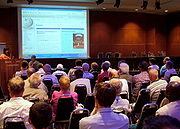
Esperanto Wikipedia
Encyclopedia
The Esperanto Wikipedia is the Esperanto
edition of Wikipedia
, which started in December 2001 as the eleventh edition of Wikipedia (alongside the Basque Wikipedia
). With about articles, it is the 27th-largest Wikipedia as measured by the number of articles, and the largest Wikipedia in a constructed language
.
The Esperanto Wikipedia started off with the 139 articles of the by Stefano Kalb.
As of November 2011, the Esperanto Wikipedia has 224 articles of feature quality () and a further 181 considered worth reading (). Weekly community projects include a Collaboration of the Week () which improves neglected articles and an Article of the Week featuring good-quality articles on the front page. The Esperanto community is a frequent contributor to the Meta project, Translation of the week.
According to the List of Wikipedias by sample of articles at Meta, a list based on List of articles every Wikipedia should have, Esperanto ranks 37th, lacking almost none of the list of vital articles, but having in general relatively short articles.
On November 18, 2008, the Esperanto Wikipedia implemented the Flagged revisions extension.
As of November 2011, The Esperanto Wikipedia has the 3rd greatest number of articles per speaker among Wikipedias with over 100,000 articles, and ranks 10th overall. These figures were based on Ethnologue
's estimate of 2,000,000 Esperanto speakers.
 Including learners and other Esperantists of all levels, many experienced Esperantists and native Esperantists have joined the project. At least three editors are members of the Academy of Esperanto, Gerrit Berveling
Including learners and other Esperantists of all levels, many experienced Esperantists and native Esperantists have joined the project. At least three editors are members of the Academy of Esperanto, Gerrit Berveling
, John C. Wells
, and Bertilo Wennergren
, a notable Esperanto grammarian and the director of the Academy's section about Esperanto vocabulary
.
incorporates, with permission, the content of the 1934 and also content of several reference books and the monthly periodical .
The Esperanto Wikipedia has been featured in many Esperanto news media, including a radio interview at Radio Polonia, and recent articles at , , and . The Esperanto Wikimania, a gathering held in 2011 to celebrate the encyclopedia's 10th anniversary, has been subsidized by the host city of Svitavy
(Czech Republic
) and the Pardubice Region
and covered by Czech Television
.
Esperanto organisations like Universal Esperanto Association do not contribute to but support it by providing chambers at Esperanto conventions for presentations and trainings. At the World Esperanto Congress in Rotterdam, summer 2008, there have been two Wikipedian meetups and a lecture at Esperantology Conference.
Esperanto
is the most widely spoken constructed international auxiliary language. Its name derives from Doktoro Esperanto , the pseudonym under which L. L. Zamenhof published the first book detailing Esperanto, the Unua Libro, in 1887...
edition of Wikipedia
Wikipedia
Wikipedia is a free, web-based, collaborative, multilingual encyclopedia project supported by the non-profit Wikimedia Foundation. Its 20 million articles have been written collaboratively by volunteers around the world. Almost all of its articles can be edited by anyone with access to the site,...
, which started in December 2001 as the eleventh edition of Wikipedia (alongside the Basque Wikipedia
Basque Wikipedia
The Basque Wikipedia is the Basque language edition of Wikipedia. Founded on December 6, 2001 and reaching 58,124 articles by August 19, 2010, making it the 45th-largest Wikipedia...
). With about articles, it is the 27th-largest Wikipedia as measured by the number of articles, and the largest Wikipedia in a constructed language
Constructed language
A planned or constructed language—known colloquially as a conlang—is a language whose phonology, grammar, and/or vocabulary has been consciously devised by an individual or group, instead of having evolved naturally...
.
The Esperanto Wikipedia started off with the 139 articles of the by Stefano Kalb.
Wikipedia handbook in Esperanto
The Esperanto Wikipedia community has created and published a 40-page "Wikipedia: Practical Handbook" () which is sold on-line and at conventions. The manual is intended to give new Wikipedians advice and information on how to edit Wikipedia in Esperanto. It is currently in its second printing.Quality of the Esperanto Wikipedia
As of November 2011, the Esperanto Wikipedia has 224 articles of feature quality () and a further 181 considered worth reading (). Weekly community projects include a Collaboration of the Week () which improves neglected articles and an Article of the Week featuring good-quality articles on the front page. The Esperanto community is a frequent contributor to the Meta project, Translation of the week.
According to the List of Wikipedias by sample of articles at Meta, a list based on List of articles every Wikipedia should have, Esperanto ranks 37th, lacking almost none of the list of vital articles, but having in general relatively short articles.
On November 18, 2008, the Esperanto Wikipedia implemented the Flagged revisions extension.
As of November 2011, The Esperanto Wikipedia has the 3rd greatest number of articles per speaker among Wikipedias with over 100,000 articles, and ranks 10th overall. These figures were based on Ethnologue
Ethnologue
Ethnologue: Languages of the World is a web and print publication of SIL International , a Christian linguistic service organization, which studies lesser-known languages, to provide the speakers with Bibles in their native language and support their efforts in language development.The Ethnologue...
's estimate of 2,000,000 Esperanto speakers.
Notability within the Esperanto community

Gerrit Berveling
Gerrit Berveling is a Dutch Esperanto author.He studied Classical Languages at Leiden University, and Theology at Utrecht and Leiden Universities....
, John C. Wells
John C. Wells
John Christopher Wells is a British phonetician and Esperanto teacher. Wells is a professor emeritus at University College London, where until his retirement in 2006 he held the departmental chair in phonetics....
, and Bertilo Wennergren
Bertilo Wennergren
Bertilo Wennergren [VEN-er-gren] , born 4 October 1956, is a Swedish Esperantist currently living in Seoul, South Korea...
, a notable Esperanto grammarian and the director of the Academy's section about Esperanto vocabulary
Vocabulary
A person's vocabulary is the set of words within a language that are familiar to that person. A vocabulary usually develops with age, and serves as a useful and fundamental tool for communication and acquiring knowledge...
.
incorporates, with permission, the content of the 1934 and also content of several reference books and the monthly periodical .
The Esperanto Wikipedia has been featured in many Esperanto news media, including a radio interview at Radio Polonia, and recent articles at , , and . The Esperanto Wikimania, a gathering held in 2011 to celebrate the encyclopedia's 10th anniversary, has been subsidized by the host city of Svitavy
Svitavy
Svitavy is a town in the Svitavy District in the Pardubice Region of the Czech Republic. The town has a population of 18,000 and is also the district administrative centre...
(Czech Republic
Czech Republic
The Czech Republic is a landlocked country in Central Europe. The country is bordered by Poland to the northeast, Slovakia to the east, Austria to the south, and Germany to the west and northwest....
) and the Pardubice Region
Pardubice Region
Pardubice Region is an administrative unit of the Czech Republic, located mainly in the eastern part of its historical region of Bohemia, with a small part in northwestern Moravia. It is named after its capital Pardubice. "There are a total of 452 municipalities in the region...
and covered by Czech Television
Czech television
Czech television may refer to:*Television in the Czech Republic*Česká televize...
.
Esperanto organisations like Universal Esperanto Association do not contribute to but support it by providing chambers at Esperanto conventions for presentations and trainings. At the World Esperanto Congress in Rotterdam, summer 2008, there have been two Wikipedian meetups and a lecture at Esperantology Conference.

